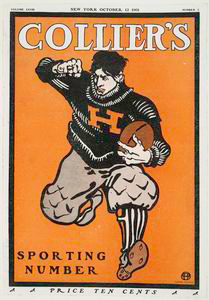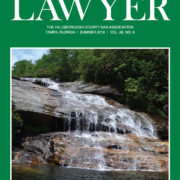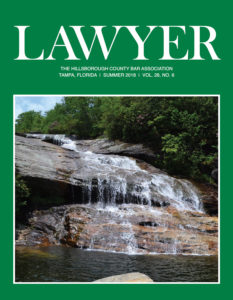Pleading and the Many Faces of Waiver

Don’t drop the ball
on pleading and waiver issues!
Image courtesy The Miriam and Ira D. Wallach Division of Art, Prints and Photographs: Art & Architecture Collection, The New York Public Library Digital Collections. 1890 – 1907.
We won! Today in Derouin v. Universal American Mortgage Company, LLC, Case No. 2D17-1002 (Fla. 2d DCA August 22, 2018)(.pdf), we earned a total victory for our clients the Derouins, reversing the foreclosure judgment entered against them after trial and ordering entry of an involuntary dismissal of the claims against them.
Beyond the wonderful result for our clients, the 15-page opinion is chock full of great appellate nuggets that have implications for all trial lawyers and their clients on issues of pleading requirements, waiver, trial by consent, and the right of a client to direct communication through his or her attorney. Here’s a breakdown of the take away lessons.
Pleading and Avoiding Conditions Precedent
Like many contracts, the mortgage in this case contained notice provisions that create a condition precedent to suit — that is, the party seeking to enforce the contract must first do some act before filing suit in order to maintain suit. Here, that condition precedent was compliance with a pre-suit “face-to-face” meeting requirement imposed by Federal law on certain kinds of mortgages and incorporated by reference into the mortgage. Generally, a plaintiff is permitted to allege generally in the complaint that “all conditions to suit have been met or waived.” The burden is then on the defendant to specifically deny that general allegation. Some cases on this issue send a mixed message as to whether failing to specifically deny the allegation, but pleading the same issue in your defenses, or making a specific denial but not also pleading as an affirmative defense, is sufficient to make compliance with conditions precedent an issue at trial. The Court here discussed the unsettled law and decided it didn’t need to make a definitive holding on this issue, since the Derouins had done both. Still, the Court placed the burden on plaintiff to prove it complied with the conditions precedent, and then found that plaintiff had not made that proof.
Practice Tip: Always deny conditions precedent with specificity in the answer and, in an abundance of caution, also plead failure to comply as a defense. Maintain it is the plaintiff’s burden, and argue as such at the close of plaintiff’s case.
Pleading Avoidances in a Reply
The plaintiff’s argued that the Derouins waived their objection to compliance with the face-to-face counseling condition precedent for two reasons we’ll discuss in detail in the next section. But aside from the merits of the waiver argument, the appeal court concluded that “Because Universal failed to address the waiver issue by reply to an affirmative defense, the trial court could not award Universal relief on such a basis.”
Practice Tip: Remember to plead any “defense to a defense,” whether legal or factual, as an avoidance in a reply. You will waive your waiver arguments (or other avoidances) if you do not plead them.
Trial by Consent
Even though the Bank failed to plead waiver, it argued that the issue of waiver was tried by consent, citing Fla. R. Civ. P. 1.190(b). A party tries an issue by consent when it fails to object to the admission of evidence supporting the un-pleaded argument. The Court found that evidence that came in was relevant to other issues in the case, and so its admission without objection was not a waiver. The Court also noted that the Derouin’s counsel expressly stated in opening argument that the Bank never raised any excuse for non-compliance in its pleadings. The Derouins also expressly made the argument in a written post-trial memoranda ordered by the trial court. The Court therefore rejected the notion that the issue had been tried by consent.
Practice Tip: Mention in your opening statement that you object to trying issues by consent. And if not relevant to your defenses, object to testimony coming in to support any issues outside of the pleadings. The proper objection is to relevance, and if you can, also state “outside the scope of the pleadings.” Bring the argument home during oral or written closing arguments.
Waiver
The trial court found that the Derouins had waived their right to face-to-face counseling in two ways. First, the trial court found that Mrs. Derouin advising someone who called to discuss the issue “that I contacted an attorney and they should direct all questions to the attorney” indicated that the Derouins rejected a face-to-face meeting. Second, the trial court found that the Derouin’s refusal to agree to mediation after suit had been filed also constituted a waiver of the right to pre-suit counseling.
The Second District rejected both of these rulings. The Court found that “There was no evidence Universal or its servicer was prohibited from asking the Derouins for a face-to-face meeting through their attorney, nor was there any evidence that the Derouins would not participate in one if asked.” Derouin at 11. The Court also rejected the notion that a post-suit action could indicate a waiver of pre-suit requirements, reinforcing an important older Florida Supreme Court case holding that a party’s right to sue “must be measured by the facts as they exist when the suit was instituted.” Derouin at 11, citing Voges v. Ward, 123 So. 785, 793 (Fla. 1929).
Practice Tip: Argue only the facts at the time of suit when arguing compliance with conditions precedent. Also, clients may defer to their attorneys without waiving their rights.
Great job to Dan Rock as trial co-counsel for getting that record preserved. The appeal was a true team effort, with Jared Krukar writing the majority of the briefing and Dineen Wasylik conducting oral argument.




